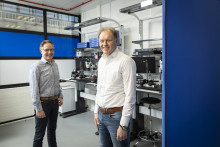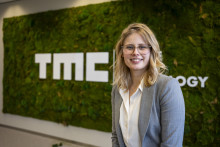PHIX specializes in designing and producing packaging for photonic integrated circuits, chips in which photons are the carriers of data and energy. Such chips have potential applications in countless areas, including biosensors for virus detection, LIDAR systems in self-driving vehicles and antennas transmitting 5G signal. However, as the start-up’s CEO points out, photonics is such a new industry that all the possible applications are not even known yet. ‘It’s a completely new technology. It will open doors that are still closed now,’ says Hasper. Other businesses and institutes seem to agree. PHIX currently has over 150 customers, including the University of Twente. ‘Photonics is quite hot. Many companies are starting to use it.’
From one spin-off to another
Seeing this development, the two founders decided to take technology developed at UT spin-off LioniX International, where Van Kerkhof worked, and enter the market with PHIX, a separate business focused primarily on one part of the photonics production: the packaging. ‘Unlike with semiconducting chips, the price of photonic chips is mostly determined by the packaging. That is the biggest cost,’ says Hasper. ‘We don’t have one specific product. We help our customers develop packaging suited to their needs. This process is rather complex. Photonic chips are not just connected with wires, they need to be interfaced with other components, such as optical fibers, free space optical components and electronics, before they can find their way into your product. Plus, there are usually multiple chips in one package and they need to be perfectly aligned. All of this needs to be extremely accurate.’
two UT alumni
Albert Hasper, Chief Executive Officer of PHIX, has a Master (1986) and PhD Degree (1992) in Electrical Engineering from the University of Twente. Before co-founding PHIX, he worked as an operational and technical executive in international high-tech business-to-business industry. He was the VP of Global Operations at ASM International, General Manager of Tempress Systems B.V. and the Managing Director of the Amtech Solar Companies, to name a few of his roles.
Joost van Kerkhof, Chief Operations Officer of PHIX, also holds a Master as well as a PhD Degree (1994) in Electrical Engineering from the UT. Prior to starting PHIX, he worked as CEO of XiO Photonics and later on as Chief Operations Officer of LioniX International.
Unpredictable
As the CEO says, PHIX currently offers custom-made solutions to its clients, but it aims to move towards automation and producing large volumes of chips. ‘We are on the right track and we expect to move to larger facilities in one or one and half years. But: forecasting developments of this market is very difficult. The photonics industry is still developing.’
Did that make it difficult to take the step and start a new company? ‘It was a risk, of course,’ answers Hasper. ‘Most start-ups don’t make it, right? But there is a lot of knowledge and support in the region to make sure it’s successful. Also, the risk and the unpredictability is what makes it attractive for me. I always worked in a corporate world where things moved very slowly. I wanted to be more independent and accelerate the development of this industry.’

Keeping it local
‘The ultimate dream is of course to grow PHIX into a large company with a few hundred employees and millions of euros in turnover,’ adds the UT alumnus. ‘However, our main ambition is to advance the technology and the whole industry, to find applications that aren’t even on the radar yet and – most of all – to keep the technology here. We have international ambitions, more than half of our twenty employees come from abroad, but we want to keep the knowhow here, not move it to Asia, for example. We want to develop new technology here in the Netherlands, in Europe, and keep it here. Our roots are in Twente and it would be nice to create jobs in the region.’
Despite the corona crisis, PHIX is still following the plan set up by Hasper and Van Kerkhof three years ago. ‘Covid has had effect on our operation, on how we use our facilities, but luckily not on the business itself,’ says the CEO. ‘As a start-up, we are halfway our journey, but we are confident that, one day soon, we can scale up and start producing millions of photonics chips and packages. For which specific applications? We want to cover the whole market, but the market is still unknown to everybody. Photonics is an open arena and that makes it very exciting.’








